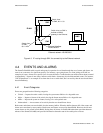
SmartCell 6A000 User Guide 4-11
Switch Administration PVC Connections
Use the show alarms command to view a list of the currently logged alarms. For example,
SmartCell ZX # show alarms
Index(ALL) :
0 000:00:31:164
---------------------------------------------------
LECS Operational
---------------------------------------------------
Failed to re-establish SAAL connection
Port ID 0x0000000b
T309 10000
1 043:15:56:718
---------------------------------------------------
Failed to re-establish SAAL connection
Port ID 0x0000000b
T309 10000
2 043:29:55:392
More(<space>/q)?:
Alarms are displayed in the following format:
•
Alarm number — The index number of the alarm in the circular buffer
•
Alarm ID — A unique ID assigned to the alarm
•
Time — Time of alarm, in switch up-time in hours, minutes, seconds, and milliseconds
•
Object — The object affected by the alarm (port, LEC, and so on)
•
Description — Brief message describing the alarm
Alarm messages can be automatically displayed on the SmartCell 6A000 console. Use the
set AlarmDisplay
command to display alarms on the console as they occur:
SmartCell ZX # set alarmdisplay
alarmDisplay(OFF) : on
SmartCell ZX #
4.4.3 Deleting Events and Alarms
To delete events or alarms currently logged within your SmartCell 6A000, use the delete events and delete alarms
commands, respectively.
4.5 PVC CONNECTIONS
The SmartCell 6A000 supports Permanent Virtual Circuits (PVCs), both point-to-point and point-to-multipoint. Use
PVCs to connect devices (that do not support SVCs) to a switch’s local client. Also, use PVCs to make connections
through the SmartCell 6A000 between devices that support only PVCs.
Use point-to-point PVCs to connect one end node to another for two-way communication. Use point-to-multipoint
PVCs to connect a broadcast end node to a group of receiving end nodes; traffic is one way.
Note PVCs use traffic descriptors to define their traffic characteristics. If you are
unfamiliar with traffic descriptors, see Section 4.6.1, “Traffic Descriptors.”


















